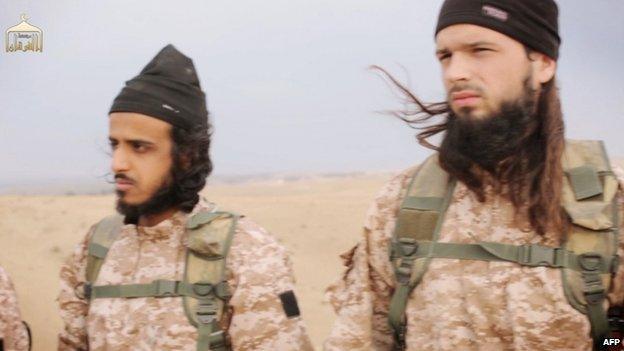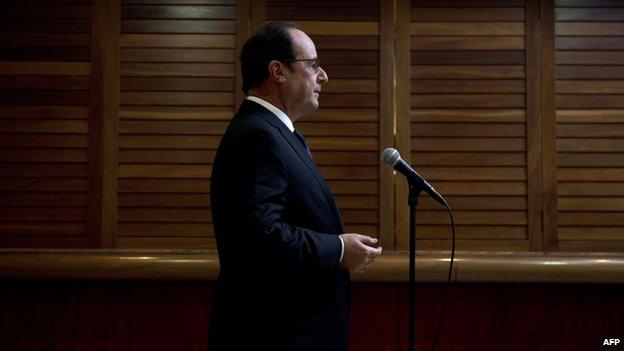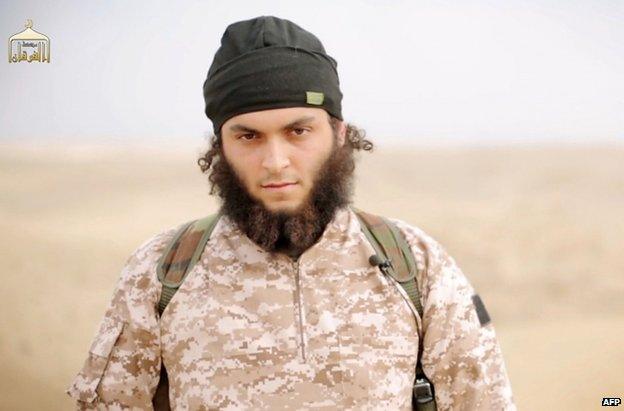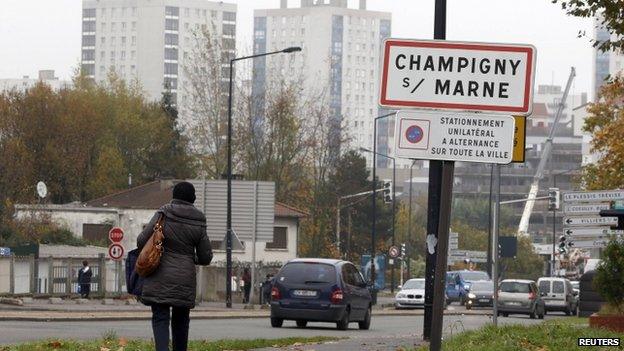What is driving French nationals to join Islamic State?
- Published

Maxime Hauchard (right) converted to Islam when he was 17 years old
Two Frenchmen that have been spotted in Islamic State's latest execution video are reported to be recent converts to Islam, sparking fresh debate in France about what's driving the appeal of Islamic State, and how to tackle it.
With delicate features and an unkempt beard, Maxime Hauchard, 22, helped to carry out executions in the arid Syrian landscape.
He was once, according to his uncle, a calm and happy little boy. "He was never even naughty as a child," Pascal Hauchard said.
But this week, Maxime became the latest name in the roll-call of Western recruits fighting alongside Islamic State.
He had already given a Skype interview to French television, describing life in Syria and his desire to become a martyr.
It's an odd kind of celebrity for a French boy from rural Normandy who, according to local reports, converted to Islam at the age of 17.
But converts appear to make up a striking number of the French citizens attracted to the militants' cause, and generate a huge amount of interest back home, as shown by the case of the British militant nicknamed "Jihadi John".
The second Frenchman has been named by prosecutors as Mickael Dos Santos, 22, from a small town just south-east of Paris.
Propaganda value
"They do it on purpose, of course they do," says Professor Jean-Pierre Filiu, from the School of International Affairs at Sciences-Po.
"Western recruits have no military value [to militant groups] at the moment; they have no training or expertise. Their value is in propaganda and recruitment. Militant leaders want to use European Muslims as hostages for their own propaganda, to generate fear of a fifth column back home. And it's working."
Responding to the latest video, President Francois Hollande said that more must be done to warn French families of the dangers of militant recruitment campaigns, which he said could touch people from every background, including converts.
Converts do appear to make up a substantial portion of those attracted to IS from France.

President Francois Hollande says families should be educated on the dangers of militant recruitment campaigns led by Islamic State
One recent survey by the French Institute, CPDSI, found that 90% of those who adopted radical Islamic beliefs had French grandparents, and that 80% came from atheist families.
Over half of all phone calls to a government helpline, set up to combat jihadist recruitment, concerned teenagers without any Muslim or Arab background. Those figures may not be representative of all French recruits in Syria, but they give some context to stories like Hauchard's.
Attraction of the cult
Pierre N'Gahane, who is a member of a government de-radicalisation team working on the issue, says the profiles of those attracted to IS ideology are hugely varied.
"You have the young girl who got high grades at school, and went to dance lessons, who in the course of a single day rejected her friends, and changed her dress and diet," he explained.
"Or the serial delinquent, always in trouble with the law, who dropped out of the army. Or the young student who was already isolated, and tips into radicalism during one moment of fragility."
Prof Filiu believes that the reason these young people have such hugely diverse profiles is partly a reflection of the tactics used by IS.

Mickael Dos Santos appeared in an online video in October calling for retaliatory attacks against French civilians over France's role in air strikes against IS in Iraq
"Any recruits that arrive are brutalised in a kind of initiation ceremony," he told the BBC, "and then they are forced to recruit four or five of their buddies through Facebook. That's why you have profiles that are so unpredictable, and why converts bring in more converts."
But, he says, it's also precisely because most of them don't come from a Muslim religious culture and aren't looking for religion at all.
Instead they are isolated teenagers, "fast-tracked" into an extreme ideology, "a cult", whose appeal is very different to the piety and purity promised by organised religion, Mr Filiu adds.
"If you look at the images sent home," he told me, " it's all pizza and guns and sunsets over the Euphrates. It's an offer to join 'the winners'. Anybody who wants to become famous knows that if he goes and kills a hostage, he'll become a star, and be splashed across the front page of the newspaper back home."
'Victim narrative'
Pierre N'Gahane agrees. "Converts to radical Islam are very different to those converting to Islam," he says.
"They don't go through the mosque. They're fragile people who are drawn to a sectarian version of Islam, and really any other kind of sect would have done just as well. The attraction is a narrative that gives them an identity as victims of Western society, and as somehow special and chosen by God."
That has clear implications for how the government here should be tackling the problem.

Dos Santos came from the eastern Paris suburb of Champigny-sur-Marne
Imams and mosques have little influence on recruitment drives which happen almost entirely on Facebook or via other internet sites. And there are few easy ways to tackle a network with such intimate connections and such disparate appeal.
Some have blamed France's social inequality or lack of integration, but surveys have suggested that many converts are from well-integrated, middle-class families.
But with more than 1,000 French citizens now either fighting with groups like IS, en route to join them, planning to do so, or returning to France, the government is under pressure to curb the flow of recruits.
It has launched several programmes designed to target those at risk. One of the most recent, says Mr N'Gahane, focuses on offering psychological support to those wanting to leave France to join the group.
The police now also have the power to confiscate the passports of anyone believed to be about to flee.
Prof Filiu says societies may always harbour a radical fringe, ripe for cults to tap into.
What makes this recruitment drive so effective, he believes, is the way it harnesses the internet for a simple but effective propaganda campaign. The only way to counter it, he says, is to ignore the European faces in its execution videos, and its use of Islamic symbols, and focus on the victims.
But so far, he says, "they're winning. And we're just following each red herring they throw at us".